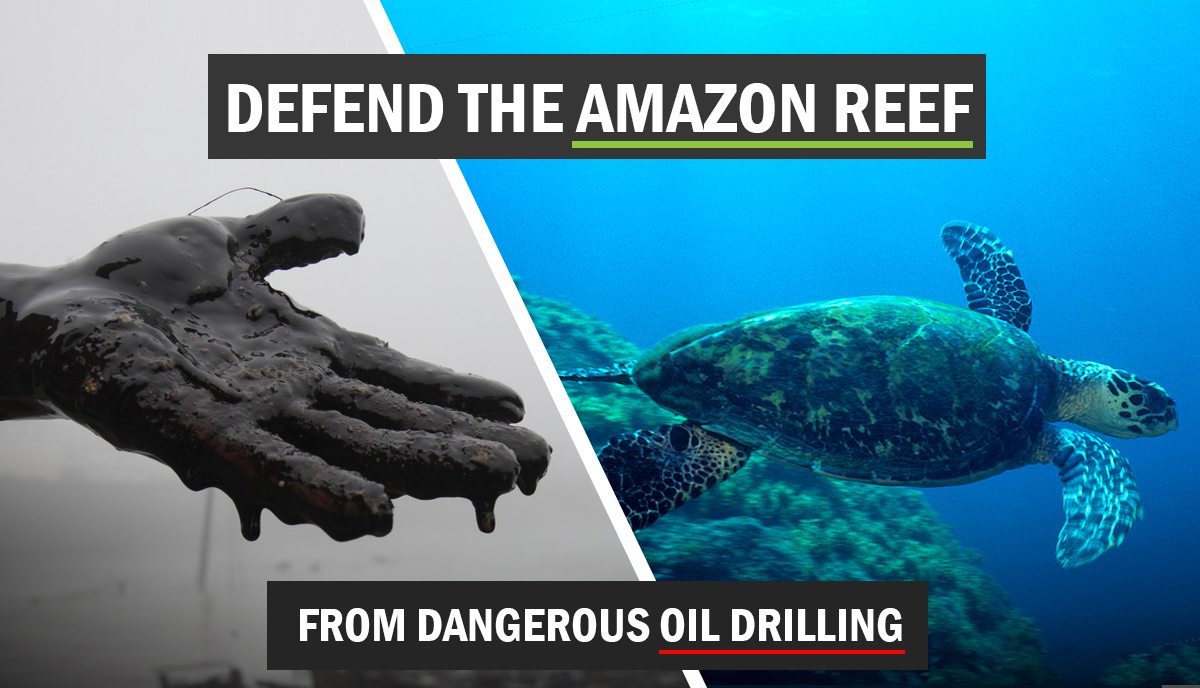The Amazon Reef is a precious and unique ecosystem which extends for over 9500km² off the northern coast of Brazil

A group of 40 scientists naturalists, explorers and broadcasters are sounding the alarm over oil companies’ spill threat to the Amazon Reef. Read the full story here.
The letter
The Amazon Reef is a precious and unique ecosystem which extends for over 9500km² off the northern coast of Brazil.
“The Amazon Reef is a thriving and dynamic ecosystem”
Where the Amazon River pours into the ocean, the surrounding waters are initially dark and silty – a very unusual environment for a rich carbonate reef ecosystem to exist. Home to pink corals, coralline algae, more than 70 species of reef fish and more than 60 species of sponge, the Amazon Reef is a thriving and dynamic ecosystem that has barely been explored, but may already be under threat.
“There is a high likelihood of new species discoveries”
So far, only a small fraction of the reef has been investigated in any detail, but already it appears that there is a high likelihood of new species discoveries. The first underwater images of the Amazon Reef were captured in early 2017, and scientists have just begun to document the reef’s biodiversity. Understanding of the ways in which this novel reef ecosystem functions and interacts with the Amazon river plume and the surrounding ocean remains very limited.
“Plans to drill for oil in nearby waters pose significant pressures and risks”
Plans to drill for oil in nearby waters pose significant pressures and risks, whether from drilling itself or from the threat of significant oil spills, which even the companies’ own oil spill modelling give up to a 30% chance of reaching the reef. A spill here could negatively impact the reef and the wider basin; an area home to vulnerable species including the Amazonian manatee and leatherback sea turtle, among many others.
“The priority should be to protect the reef and surrounding waters”
The priority should be to protect the reef and surrounding waters in order to conduct further research on the reef to provide greater insight into its species diversity, structure and function, as well as the interconnections it has with other surrounding ecosystems, before any decisions are made concerning further human exploitation of the area.
Signatories
Scientists
Jason Hall- Spencer, Professor of Marine Biology (Plymouth University) UK
Ove Hoegh-Guldberg, Director of Global Change Institute, Professor of Marine Science (University of Queensland)
Murray Roberts, Professor of Applied Marine Biology and Ecology (University of Edinburgh) UK
Paulo Horta, Coralline Algae scientist (UFSC-Brazil)
Ronaldo Francini Filho, Marine Biologist, author of 2016 reef article ( UFPB – Brazil)
Eduardo Siegle, Oceanographer, author of 2016 reef article (USP- Brazil)
Paulo Artaxo, Climatologist, Geochemist & Meterologist (USP – Brazil)
Paulo Nobre, Senior Researcher- weather & climate (INPE – Brazil)
Ricardo Abramovay, Economist and Professor- Economics (FEA/USP – Brazil)
Juline Walter, Marine Biologist, (UFRJ – Brazil)
Ricardo Abramovay, Economist and Professor- Economics (FEA/USP – Brazil)
Juline Walter Marine Biologist, (UFRJ – Brazil)
Patrizia Ziveri, ICREA Research Professor and Scientific Director at the Institute of Environmental Science and Technology (ICTA) Unit of Excellence, Universitat Autònoma de Barcelona (UAB).
Pavan Sukhdev, Economist, Study Leader of TEEB, Lead Author of ‘Towards a Green Economy’, UNEP, and Author of ‘Corporation 2020’
Antônio Donato Nobre PhD, Senior Researcher INPA, Visiting Researcher INPE/Brazil, author of “The Future Climate of Amazonia”
Nils Edwin Asp Neto, Oceanographer, author of 2016 reef article (UFPA- Brazil)
Dr. Melissa Shaw, Aquatic Animal Medicine- endangered mammal species specialist
Dr. Carlos Eduardo Leite Ferreira, Ecologist- Lab of Ecology and Connservation reef environments. Fluminese Federal University (Brazil)
Abilio Soares Gomes, Marine Biologist- sediment ecology lab, Federal Fluminese University (Brazil)
Ashley Carreiro, Marine Biologist- Marine Conservation Phillipines
Dr. Anthony W D Larkum, Expert in coral bleaching and reef algae- University of Sydney
Dr. Emma Kennedy, Benthic Ecologist (coral reef scientist)- University of Queensland
John Hocevar, Marine Biologist and director of Greenpeace USA ocean campaigns
Cesar Cordeiro, Marine Biologist- Fluminese Federal University (Brazil)
Carlos Nobre, INPE/ member of IPCC (Brazil)
Deevon Quirolo, President of Nature Coast Conservation, USA
Sean McQuilken, Marine Protected Species Observer/ Biologist, USA
Valeria Pizarro, Biologist and Ecologist- Executive Director of Ecomares NGO, Colombia
Silvia Earle, Oceanographer, Founder and President, Mission Blue
David Bellhoff, Biologist (GIZ (sust. dev organisation)- Protected Area Management Enhancement Project Phillippines)
Public figures
Sir Ranulph Fiennes, Explorer
David Mayer De Rothschild, Ecologist & Environmentalist
Liz Bonnin, Presenter of Galapagos & other shows, recently observed sharks in Pacific Ocean
Bill Oddie, Conservationist
Simon Reeve, TV presenter and ambassador for WWF
Michaela Strachan, children’s wildlife programmes, investigated coral reefs for CBBC
Ben Fogle, Animal and nature broadcaster
Abigail Fallis, Artist working on consumerism and the environment
Kurt and Caroline Jackson, British painter reflecting ecology and environment
Bruce Parry, Explorer, broadcaster
Livia Firth, Founder of sustainable fashion company


